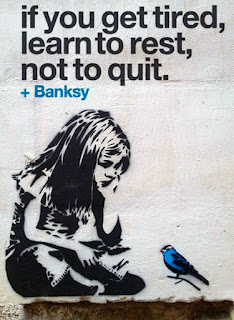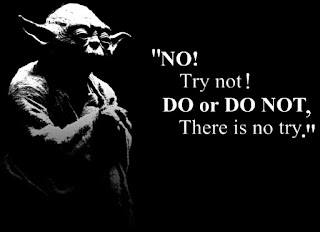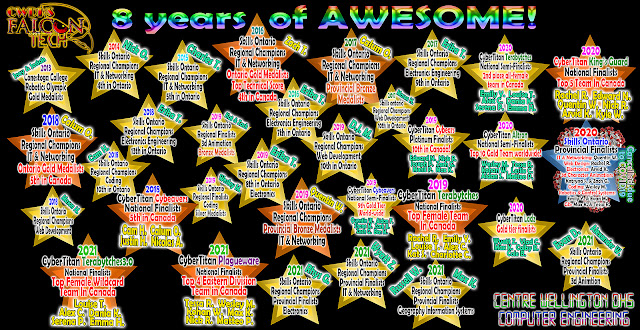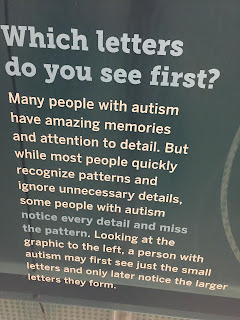The competition season is finally winding down. Student competition is one of my favourite parts about being a teacher. It allows for radical differentiation in a wide variety of directions, shines a light on my gotta-market-it-or-it’ll-die program and helps guide our program development by clarifying what we’re already covering and pointing us in the direction of emerging digital trends.
I got a good piece of advice from a prof at Nipissing teacher’s college back in 2003. We were all struggling to get through a dense curriculum when he suggested I leverage my computer skills to take a swing at Statistics Canada’s yearly awards for post-secondary research (you might have noticed Stats-Can coming up in Dusty world a fair bit – that’s why). We were using Stats-Can to research the communities our practicums were in and I found the data gave me a better understanding of my teaching environment, but doing the contest seemed like more than I could manage at the time.
My professor, John Lundy, said, “you’ve almost talked yourself out of doing this but so has everyone else. If you stay with it you might be surprised at the results. You’d be amazed how often you can win things by sticking with it.” It was good advice. I stuck it out and the award paid for my last semester at teacher’s college. You’d be amazed how often you can win things just but toughing it out and not giving up.
When I picked up teaching computer technology almost a decade ago we stumbled across a robotics competition at Conestoga College and gave it a shot – and medalled! I’d been supporting students in media arts at Skills Ontario so I looked at all the digital competitions and started lining us up for them. As a new teacher attempting to deliver a ridiculously far-reaching curriculum I found competition invaluable for directing our research and development. Ontario covers IT, networking, electronics, robotics and low and high level programming in the computer technology curriculum. All of those things would have their own program in any other subject. No teacher has advanced expertise in all of them (my background is in IT), so Skills Ontario in particularly really helped us get our program into focus and allowed me to differentiate for students developing in those many diverse pathways.
Students almost always doubted their ability to participate let alone compete, even when we found ourselves at national finals, but I was always able to pass on that simple advice: give it a shot, see what happens. This consistent approach, though quite minimalist in appearance, has paid dividends.
I’d spent many years coaching various sports teams in school prior to shifting my focus to program based technical competitions. For many students sports are the hook that keeps them in school but I found that it often ended up providing entertainment for the most privileged students (you don’t have time for practices and games four days a week when you’re working). The technology competitions we participate in are accessible to all students and I’ve seen them raise kids out of difficult home lives and launch them into meaningful careers, so there is equity in this as well.
At the Canadian Cyber Defence Challenge our two teams finished well into the top 10, in 6th and 7th place with our female team once again showing the value of communication skills in the field of cybersecurity. I like CCDC for their multi-pronged approach to cyber defence. They don’t just run it like a hack-a-thon but place emphasis on the team’s ability to communicate their technical findings to non-technical management, which is very much a real world aspect of cybersecurity that gets ignored elsewhere.
We were gutted last year to see Skills Ontario vanish in the chaos of the first wave of COVID19. We had the most finalists in our short history lined up for the 2020 provincial finals and several gold-medal prospects. It was heart wrenching to see those opportunities borne from years of effort fade away. A competitive Skills Ontario student takes years to develop so losing an opportunity to compete isn’t the loss of a single year of effort.
| Skills Ontario was still very much a ‘hands on’ competition, even in this year of COVID remote schooling. |
This year the organizers have done a spectacular job keeping as many competitions running as they could remotely. This is especially challenging in a hands-on technical skills competition where many of the students are working with tools, live electricity and other safety challenges, but Skills Ontario pulled it off magnificently.
When our electronics competitor, Rhys, got a package in the mail for electronics engineering I was buoyed by the hope that these weren’t going to be all screen based simulations. We do well on tactile skills at Skills so seeing them retained was encouraging.
It didn’t start well though. Many students are struggling with work life balance in harsh and inequitable quadmestered hybrid scheduling. Web development is a tricky competition as it’s half technical/back-end coding and data management and half front-end graphic design, marketing and ergonomics. We had one of the most ambidextrous technical and artistic students yet lined up to do it but she couldn’t participate due to pandemic related stressors. I had a graduating student who was already working as a web-developer in the summers. He didn’t have the graphic design skills but he was spectacular at back-end programming and would have been very competitive, but he ended up dropping out due to crushing homework loads that he thought, “should be illegal”. So, our first Skills competition of the 2021 season was also our first ever DNF.
This induced a great deal of anxiety in me. I coach in these events to engage and enable students, not to make them feel like they’re being run over, I shouldn’t have worried though. The next week Max and Russell cranked out our first run at Geography Information Systems (GIS). We don’t work with GIS and didn’t know what it was two years ago, but last year we had two students leverage the digital skills we develop in class and figure out the software. Max continued in it this year and when paired with the incredibly technically talented Russell, they both did a great job winning a bronze medal!
Two days later two of our top digital artists from last year’s gamedev class took a run at 3d Character Animation. This was another competition that we don’t cover in our curriculum, though our game development class uses Blender 3d modelling and the Unity game engine, so I thought we might be able to bridge that gap. Evan and Alexander worked away at their animation over the weekend and submitted the minimum six seconds of work by the due date. They didn’t medal but I hope they placed.
The next week we were in a three day marathon with our three core competitions: electronics engineering on Tuesday, IT & Networking on Wednesday and Coding on Thursday. Rhys volunteered to take a swing at electronics. Being new to secondary competition and only in grade 9 I signed him up as a no-stress reconnaissance of the competition, but I’ve learned never to underestimate Rhys who astonished everyone with our first ever silver medal at Skills provincials! Wyatt is one of our most talented IT technicians to date, and we’ve had many. He was worried that he’d fumbled the competition in his first run at it online, but I suspected even a bad day for Wyatt was better than most people’s good days. That turned out to the be the case as Wyatt kept our string of five consecutive Skills Ontario medals in IT & Networking alive with a bronze medal.
On the final day the mighty Matteo, who was also still competing in the national finals of CCDC, did Skills Ontario’s coding provincial finals. I’ve thrown exceptional students at this previously and we’d broken into the top ten but with our school shuttering on-site computer science I’ve been left as the only teacher in the building covering coding, which seems incredible in 2021. While juggling CCDC (I had to get him excused from Skills for twenty minutes to present to the judges in CCDC finals), Matteo battled to an astonishing silver medal finish in what is always a very crowded and competitive Skills Ontario competition.
Four out of six (it would have been five if we could have stuck the webdev) is a spectacular run for a program that had only previously cracked IT & Networking. I’m hoping we can build on this momentum next year as every one of our medalists is returning.
With Skills Ontario behind us we turned to CyberTitan National Finals this past week where our senior co-ed, female captained team was potentially dangerous and our all-female top wild card team simply wanted to do their best and enjoy what would be the second and final national finals event for the senior Terabytches who started the team and changed the complexion of the event three years ago.
My son Max and I were watching the awards ceremony online on Wednesday afternoon. This event feels like battling giants because the schools we’re up against are specialists with access to resources we can only dream about. I was eating pie and waiting to see who won when I was astonished to see FalconTech Plagueware being awarded the Cyber Defender Award. I frantically started searching for my competition t-shirt so I could have it on as asked when we went live for an interview.
We’ve had more academically focused teams (our two 5th place finishing teams in 2018 and 2020 for example) in this competition, but Plagueware is by far the most diverse. Our team captain (the webdev artist/technician) is a Cisco networking wizard who got some of the highest scores in Canada during CyberPatriot – and she’s in grade 10! Unfortunately, that network architecture skillset doesn’t get any exercise at CyberTitan nationals. Our Skills coding silver medalist is on the team as is our Skills GIS bronze medalist. The team also contains one of the team members from last year’s 5th place team who connected us to that team’s skills and experience, along with our first ever grade 9 to get a perfect score in Windows 10 on CyberPatriot and the coop student who ran our award winning junior team last year.
Plagueware are an incredibly diverse and talented group. A third of the team are applied stream students who couldn’t even get into the schools we’re up against. A third of the team are autistic and the majority of the team have individual education plans due to special leaning needs. From the academic streamist’s point of view this team wouldn’t rate, and yet they finished 4th in Canada beating most of the competition. Their audacity and out-of-the-box thinking also won them the Defender of the Year award for the team the judges felt demonstrated the most innovative and team based approach.
That result has me thinking about how to remix teams for a wider range of skills and approaches. As our first Terabytches graduate I’m thinking maybe it’s time to work towards co-ed teams that offer a complimentary set of skills that make students not only competitive but also valued for their differences.
Convincing students to take the risk and compete against students from other boards and provinces gives me a barometer for how effective our program is and offers support and direction as we continue to develop skills in a wide variety of digital disciplines. For students these experiences can be defining both in developing confidence and technical fluency. This approach benefits students in all streams and offers both a tool for equity by providing enrichment for students who can’t otherwise afford to participate in extracurriculars.
The most difficult part remains convincing students to give it a go, but when they do they often see great success just by giving it a shot. If you are interested in developing digital fluency in your students there are a variety of competitions available that can help you make that happen for little or no cost.
COMPETITION LINKS
Skills Ontario: These are the scopes for competition (they describe what each competition is about and how it will run): https://www.skillsontario.com/competitions/secondary/scopes
Whatever you teach, Skills will have a competition that aligns with your curriculum.
CyberTitan: National Student Cybersecurity Competition. CyberTitan is the Canadian arm of the international U.S. based CyberPatriot competition. It costs a couple of hundred dollars to participate but the students get a lot of cyber-swag and the competition is very well run and accessible. The event runs from October to January in three rounds that can happen as an in-school field trip.
Canadian Cyber Defence Challenge: CCDC runs out of Winnipeg and has good pickup in Western Canada, though I think we still may be the only team east of Winnipeg participating in it. It is a very accessible and innovative competition with live drama student performances bringing the competition to life and a points assessment that includes quality of student understanding that prevents schools who are scripting their wins from doing well.
CanHack: based on the PicoCTF U.S. based cyber competition. It’s very computer science/mathematics based and would work well as an enhancement for any comp-sci program. With no local comp-sci at our school, we use this competition to help fill that hole.
ECOO Programming Contest: another comp-sci/maths focused contest. We haven’t done it because the math department usually does it, or doesn’t.
from Blogger https://ift.tt/3vj9TfA
via IFTTT




















